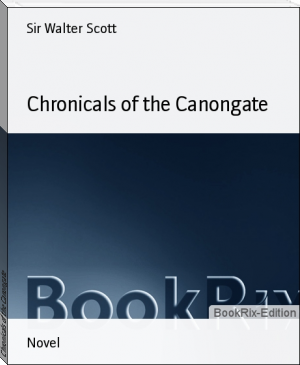The Surgeon's Daughter, Walter Scott [love letters to the dead txt] 📗

- Author: Walter Scott
Book online «The Surgeon's Daughter, Walter Scott [love letters to the dead txt] 📗». Author Walter Scott
The Doctor having a large family, with a very limited income to support them, and understanding that D——— had at last become a person of sober and industrious habits, he gave his consent, in which Emma's mother fully concurred.
Aware of the straitened circumstances of the Doctor, D——— remitted a sum of money to complete at Edinburgh Emma's Oriental education, and fit her out in her journey to India; she was to embark at Sheerness, on board one of the Company's ships, for a port in India, at which place, he said, he would wait her arrival, with a retinue suited to a person of his rank in society.
Emma set out from her father's house just in time to secure a passage, as proposed by her intended husband, accompanied by her only brother, who, on their arrival at Sheerness, met one C———, an old schoolfellow, captain of the ship by which Emma was to proceed to India.
It was the particular desire of the Doctor that his daughter should be committed to the care of that gentleman, from the time of her leaving the shores of Britain, till the intended marriage ceremony was duly performed on her arrival in India; a charge that was frankly undertaken by the generous sea-captain.
On the arrival of the fleet at the appointed port, D———, with a large cavalcade of mounted Pindarees, was, as expected, in attendance, ready to salute Emma on landing, and to carry her direct into the interior of the country. C———, who had made several voyages to the shores of Hindostan, knowing something of Hindoo manners and customs, was surprised to see a private individual in the Company's service with so many attendants; and when D——— declined having the marriage ceremony performed according to the rites of the Church, till he returned to the place of his abode, C———, more and more confirmed in his suspicion that all was not right, resolved not to part with Emma till he had fulfilled, in the most satisfactory manner, the promise he had made before leaving England, of giving her duly away in marriage. Not being able by her entreaties to alter the resolution of D———, Emma solicited her protector C——— to accompany her to the place of her intended destination, to which he most readily agreed, taking with him as many of his crew as he deemed sufficient to ensure the safe custody of his innocent protege, should any attempt be made to carry her away by force.
Both parties journeyed onwards till they arrived at a frontier town, where a native Rajah was waiting the arrival of the fair maid of Fife, with whom he had fallen deeply in love, from seeing her miniature likeness in the possession of D———, to whom he had paid a large sum of money for the original, and had only intrusted him to convey her in state to the seat of his government.
No sooner was this villanous action of D——— known to C———, than he communicated the whole particulars to the commanding officer of a regiment of Scotch Highlanders that happened to be quartered in that part of India, begging at the same time, for the honour of Caledonia, and protection of injured innocence, that he would use the means in his power, of resisting any attempt that might be made by the native chief to wrest from their hands the virtuous female who had been so shamefully decoyed from her native country by the worst of mankind. Honour occupies too large a space in the heart of the Gael to resist such a call of humanity.
The Rajah, finding his claim was not to be acceded to, and resolving to enforce the same, assembled his troops, and attacked with great fury the place where the affrighted Emma was for a time secured by her countrymen, who fought in her defence with all their native valour, which at length so overpowered their assailants, that they were forced to retire in every direction, leaving behind many of their slain, among whom was found the mangled corpse of the perfidious D———.
C——— was immediately afterwards married to Emma, and my informant assured me he saw them many years afterwards, living happily together in the county of Kent, on the fortune bequeathed by the “Thane of Fife.”
J. T.CASTLE DOUGLAS, July, 1832.
MR. CROFTANGRY'S PREFACE. Indite, my muse indite, Subpoena'd is thy lyre, The praises to requite Which rules of court require. PROBATIONARY ODES.
The concluding a literary undertaking, in whole or in part, is, to the inexperienced at least, attended with an irritating titillation, like that which attends on the healing of a wound—a prurient impatience, in short, to know what the world in general, and friends in particular, will say to our labours. Some authors, I am told, profess an oyster-like indifference upon this subject; for my own part, I hardly believe in their sincerity. Others may acquire it from habit; but, in my poor opinion, a neophyte like myself must be for a long time incapable of such sang froid.
Frankly, I was ashamed to feel how childishly I felt on the occasion. No person could have said prettier things than myself upon the importance of stoicism concerning the opinion of others, when their applause or censure refers to literary character only; and I had determined to lay my work before the public, with the same unconcern with which the ostrich lays her eggs in the sand, giving herself no farther trouble concerning the incubation, but leaving to the atmosphere to bring forth the young, or otherwise, as the climate shall serve. But though an ostrich in theory, I became in practice a poor hen, who has no sooner made her deposit, but she runs cackling about, to call the attention of every one to the wonderful work which she has performed.
As soon as I became possessed of my first volume, neatly stitched up and boarded, my sense of the necessity of communicating with some one became ungovernable. Janet was inexorable, and seemed already to have tired of my literary confidence; for whenever I drew near the subject, after evading it as long as she could, she made, under some pretext or other, a bodily retreat to the kitchen or the cockloft, her own peculiar and inviolate domains. My publisher would have been a natural resource; but he understands his business too well, and follows it too closely, to desire to enter into literary discussions, wisely considering, that he who has to sell books has seldom leisure to read them. Then my acquaintance, now that I have lost Mrs. Bethune Baliol, are of that distant and accidental kind, to whom I had not face enough to communicate the nature of my uneasiness, and who probably would only have laughed at me had I made any attempt to interest them in my labours.
Reduced thus to a sort of despair, I thought of my friend and man of business, Mr. Fairscribe. His habits, it was true, were not likely to render him indulgent to light literature, and, indeed, I had more than once noticed his daughters, and especially my little songstress, whip into her reticule what looked very like a circulating library volume, as soon as her father entered the room. Still he was not only my assured, but almost my only friend, and





Comments (0)